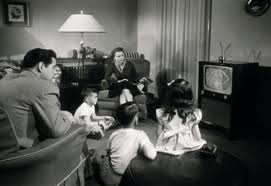
I was born in 1956 smack in the middle of the baby boomer generation. To put it another way, I’m a full-pledged member of the TV generation. In my house, the television was always on. I can’t remember a time when it wasn’t on. It started in the morning through game shows into the afternoon when my grandmother watched soap operas and all the way into the evening programming, ending with the 11 o’clock newscast.
For my generation, television was our baby sitter. It was a real bargain. Our parents put us in front of the tube. We were happy, and they were happy. Nobody asked any questions. Nobody thought about whether or not there would be repercussions. It was all clean, wholesome entertainment. Remember, these were the days of Leave It To Beaver and Father Knows Best.
Recently, I started to think. Did our parents really understand what was going on? Did they realize there were consequences for our society? The TV generation learned well. We grew up with television and wanted to be part of the industry. Later on, we would perfect the use of television by learning how to control and manipulate our audiences. By doing so, we would change the course of culture. Our parents were just looking for a cheap babysitter.
I have a number of friends who work in ministries that are addressing the issues that impact our society from drug use, alcoholism, teen pregnancy, sexual addictions, pornography, and the abortion issue. Most of these issues started to emerge in significant numbers during the 1960s and exploded throughout the 1970s. It kinda makes you wonder. Could there be a connection between television and the rapid increase of social problems?
Stay with me on this one. Think about it. What happened when television came into our homes? I know that if you weren’t there firsthand, this may be a difficult concept to understand. But overnight television became our friend. Our pal. We made it the center attraction in our living rooms. Although a television was expensive to buy, by 1960 practically every American family had one. As I said earlier, in my house the television was always on. Maybe that’s the point I’m trying to make—not that television is either good or evil, but the fact that it became a dominating and controlling factor in our lives. We couldn’t stop watching. We became addicted to the tube. And whatever the tube said was truth and all important.
Furthermore, we stopped interacting with each other. We had less family time. Less time to throw the ball in the back yard. Less time to check in on our daily lives. Less time for help with homework. Less time to be creative. Our lives became separate. In some families, even during the dinner hour, the television would still be on. Do you see a pattern here?
If the family unit doesn’t know what’s happening in each other’s lives, will we be able to see issues that could become problems? Our ability to connect and be united as a family started to disintegrate. Perhaps, this helps to explain why the family today is in critical condition.
If anything, with the acceleration of technology and mobile media devices, we now live a world in which you can access your media any time, any place, any device. What do you think that’s doing to further break down the family unit?
There’s one other point to consider. As baby boomers, our parents bought into the message that television was communicating. They determined to have it all no matter the cost. What they saw on their shiny TVs was The American Dream. A new house in the suburbs with a white picket fence. The finest automobiles Detroit could build. Modern appliances. A swimming pool. Dream vacations. Fashionable clothes and a lifestyle that only their parents could dream about. Who wouldn’t want it? That’s what television was selling. And we were buying.
But what about the cost? How much time would our parents have to spend away from home working long hours and sometimes weekends. In some households both parents had to work to achieve the American Dream. And what was the effect on the children? My generation. The TV generation. Our babysitter taught us well. Perhaps we learned too well. And we have passed it on to our children. And they have mastered it.
It’s never too late to change our course and the course of our children and grandchildren. We still have time. But in this media-saturated culture, we have to learn how to create some space so we can once again connect as a family.



